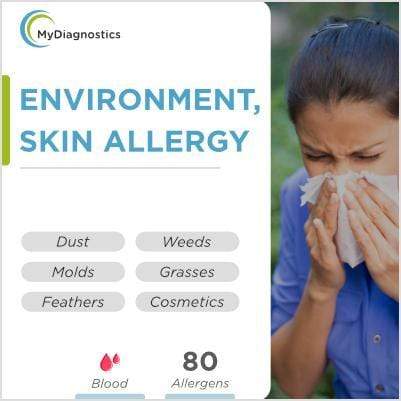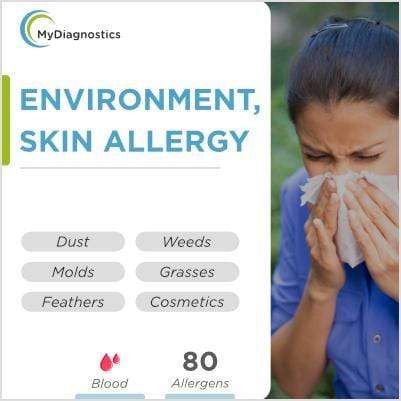Allergy Testing – IgE, Skin, Eczema & Respiratory Blood Test at Home
Test Parameters


About the IgE, Skin & Respiratory Allergy Test
Allergies occur when your immune system reacts to certain foreign substances like dust, pollen, smoke that don’t cause a reaction in most people.
Your immune system produces proteins known as antibodies that help protect you from unwanted invaders that could make you sick or cause infection. In the case of allergies, your immune system produces antibodies that identify a particular substance (allergen) as harmful, even though it isn’t. When you’re exposed to the allergen, the antibodies release a number of chemicals, such as histamine, that can inflame your skin, sinuses, airways, or digestive system.
Symptoms of Skin & Respiratory Allergy
- Nasal Congestion,
- itchy and watery eyes,
- Sneezing,
- Stuffy or runny nose,
- Scratchy or sore throat,
- Throat clearing,
- cough from postnasal drip.
- Skin Conditions such as Eczema
Eczema is a condition that makes your skin red and itchy. It’s common in children but can occur at any age. Eczema is associated with allergies, and it may be accompanied by asthma or hay fever.
Other signs and symptoms include patches of thickened, cracked and scaly skin, and small, raised bumps that may leak fluid and crust over. In some people, eczema flares periodically and then clear up for a time, even for several years.
Skin and Respiratory Allergies testing process
Skin allergies (veg or non veg) are diagnosed with the help of a blood test where a blood sample is sent to a laboratory for analysis. The laboratory checks the blood for IgE antibodies to specific allergens like dust, pollen etc. If enough IgE antibodies to a particular allergen are in the blood, it's very likely that the person is allergic to it.
About the Quality
Quality assurance is done at 3 levels
- Sample collection from home using one time sealed QR coded sterile kits and transportation to the lab including the temperature condition requirements
- Sample acceptance and QC at the lab
- Sample run at the NABL/CAP/ISO certified labs
How to test for skin allergies?
MyDiagnostics provides an at-home blood test for testing skin allergies. The blood sample is tested for measuring the levels of IgE antibodies to diagnose a skin allergy.
What is the total ige level in the allergy test?
Optimal IgE levels in the blood sample for skin allergy testing is between 150 and 300 UI/ml.
What causes skin allergies?
When a particular substance triggers an abnormal immunological response in the skin, skin allergies occur. Skin allergies can be caused because of a variety of factors like -
- Immunological disorders or immune system disorders
- Medications
- Infections
Can allergy skin testing cause anaphylaxis?
Skin testing allergy test is a reliable and safe way to diagnose IgE-mediated allergies, with rare side-effects. However, prick-to-prick skin test may cause anaphylaxis. Tests should be performed only by physicians with proper training in allergy, experienced in treating promptly and properly episodes of anaphylaxis.
Can allergy skin-testing cause diarrhea?
The most common side effect of skin testing is slightly swollen, red, itchy bumps on the skin. In rare cases, a more serious reaction can occur.
Does skin allergy spread to others?
Most contagious rashes spread from person to person by direct contact. Rashes are one of the symptoms of allergy.
Does skin allergy cause fever?
Yes






